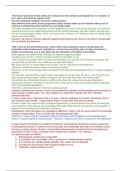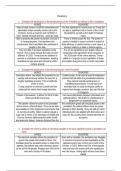Essay
Metaphysics of Mind essays
- Module
- Metaphysics of Mind
- Institution
- AQA
Graded A+, this essay regards logical behaviourism, touching all the major topics listed in the Philosophy A level syllabus. This essay is extremely useful to study from for the 25 markers, as it evaluates the questions not only with known arguments, but also with original thoughts. Helped me ac...
[Show more]




